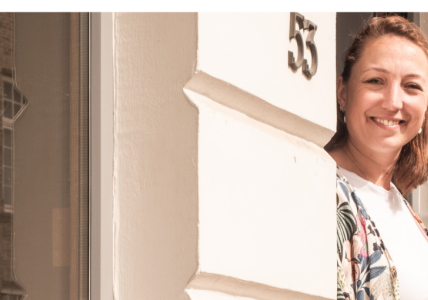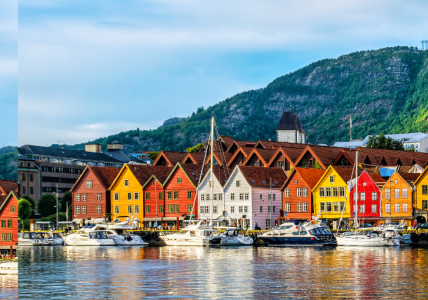BEGIN’s 39 blue and green infrastructure (BGI) pilots helped 10 North Sea Region cities enhance their climate resilience using social innovation. BEGIN reduced the risk of severe flooding at these sites, enabling some of them to withstand 1-in-200 year rain events. Important co-benefits include improved air quality, biodiversity, and citizen health and wellbeing. This award-winning project achieved benefits estimated at more than €470 million.
Climate change is here. In the past few years, Europe has experienced numerous climate-related impacts due to extreme weather events, like prolonged heatwaves and droughts, forest fires, floods, and storms.
This summer in Europe was marked by scorching heat. However, the most serious impact of climate change in the North Sea Region is the predicted surge in harsh storms, rising sea levels, and associated flood risks. By 2080, flood-induced damages throughout Europe are expected to add up to almost €100 billion (around 1/3 of Denmark’s GDP!).
Avoiding or mitigating these or other climate change effects in the future by reducing our CO2 emissions is clearly very important, but so is adapting to the changes that are already on their way!
While the reality is nothing short of concerning, climate change gives us a unique opportunity to rethink our relationship with the natural environment that surrounds us, boost the greenness of urban areas and increase their liveability.
This is where we BEGIN our story!
Results show BGI is the way forward
Since 2016, the BEGIN project has brought together 10 cities and 6 leading research partners to rethink and transform traditional urban grey infrastructure in cities with Blue-Green Infrastructure (BGI), which can mimic nature’s ability in dealing with extreme rain events. The results speak for themselves!
Through BEGIN, the resilience of close to 40 sites in the North Sea Region has increased to resist, in some cases, one-in-200 years floods! Not only that, but the social, environmental, and financial co-benefits generated at these locations have been estimated to reach €473M.
These have taken the form of improved health due to better access to green spaces, reduced maintenance costs compared to traditional grey infrastructure, opportunities for recreation, and effective flood management, among others. Adding to this, the BEGIN pilots have managed to reduce the economic impact of flood events by more than €45M!
But wait, what exactly is Blue-Green Infrastructure?
Blue-Green Infrastructure, or BGI, is a fairly new way of dealing with urban floods that builds upon the potential of green spaces and (blue) water flows in increasing the resilience to flood risks.
By using interventions like green roofs, parks, water retention ponds, rain gardens, or bioswales, BGI is considered to be a more nature-friendly alternative to addressing urban flood management, compared to traditional grey infrastructure. It not only provides a more cost-effective way of tackling urban flood risks (TEEB, 2015), but also offers important co-benefits such as increased biodiversity, aesthetics, improved air and water quality, or opportunities to connect green infrastructure in cities through “green corridors”.
BGI: Unlocking the power of nature for climate resilience

A Blue and Green Infrastructure scheme is set to increase flood resilience at the Maidencraig site, Aberdeen. Photo: Aberdeen City Council.
During the past five and a half years, BEGIN has given visibility and credibility to blue and green infrastructure as a valid tool in climate adaptation and an effective alternative to traditional grey infrastructure. BEGIN has used state-of-the-art tools and methodologies and has raised awareness of the environmental, social, and economic co-benefits of choosing blue and green over dull and less sustainable options, leading the way to more value-based decision making.
This has empowered informed decision-making at the local, regional, and national political levels where flood risk reduction is considered together with important co-benefits such as health, green accessibility, air quality, or CO2 emissions reductions.
The BEGIN partners delivered 39 BGI pilots throughout the North Sea Region. These ranged from the large-scale development of a city park in the Dordwijkzone (Dordrecht, Netherlands) to construction of 1,500 m2 of wetlands including rain gardens in the Broomfield Park in Enfield (the UK) and the development of a large-scale green axis in Ghent (Belgium) through de-paving a total of 20,000 square metres for high-quality urban green areas, open natural water bodies, and cycling paths.
Social Innovation: unlocking the power of people

The Stanford Graduate School of Business presents the following definition of social innovation:
“Social innovation is the process of developing and deploying effective solutions to challenging and often systemic social and environmental issues in support of social progress. Social innovation is not the prerogative or privilege of any organizational form or legal structure. Solutions often require the active collaboration of constituents across government, business, and the non-profit world.”
Working with social innovation within BEGIN has been an inspiring journey. BEGIN cities engaged with over 8000 stakeholders, ranging from citizens to policymakers, enterprises, and NGOs. This enabled collaborative reflections at the community level, bringing in different perspectives and visions in each case. The values generated by them eventually led to an ample support base and a sense of ownership of the BGI pilots.
Social innovation was not new to the BEGIN partners. Neither was citizen engagement. However, BEGIN was the first project to explicitly target climate adaptation by combining BGI with social innovation, and we are incredibly proud that it was a great success!
City-to-City learning powers transnational exchange
BEGIN streamlined the City-to-City learning (C2CL) approach to facilitate transnational knowledge sharing between project partners and external organisations. The C2CL approach, developed in the Interreg North Sea Region project CAMINO and validated through BEGIN, allows for structured knowledge exchanges where local differences are normalised, creating a level playing field where knowledge and experiences are better disseminated, adopted, and applied.
The project held more than 30 action-oriented C2CL workshops covering four core topics: Blue and Green Infrastructure, Resilience to floods, droughts and heat, Social Innovation, and Governance. Taking COVID-19 lockdown as an opportunity, the final year of the project saw a series of online C2CL workshops, which allowed the partners to explore the intersections between BGI and health, art and community, or biodiversity and green infrastructure, among others. They did this together with leading external universities, cities, and organisations such as ICLEI (Local Governments for Sustainability).
To learn more about the City-to-City Learning programme, please check out this dedicated section on BEGIN’s website.
BEGIN has only just begun!
The BEGIN project is now over, but its impact has only just begun to show.
BEGIN provides a broad evidence base and a validated toolbox to propel the uptake of BGI in the North Sea Region and across Europe. Over five and a half years, the project has deployed close to 40 BGI and social innovation pilots throughout the North Sea Region, translating into significant flood risk reductions, increased long-term benefits of €473 million and more than €45 million in reduced economic impact of floods in the North Sea Region.
In 2021, BEGIN won the Public Choice Award at the REGIOSTARS contest, Europe’s label for excellence in EU-funded projects.
Project manager Ellen Kelder concludes: "BEGIN has demonstrated effective climate adaptation solutions through blue-green infrastructure in urban areas, capturing and sustaining the multiple benefits og BGI through social innovation. We have helped mainstream BGI into urban planning through feasible business cases and by overcoming governance barriers."

Watch the transformations
See how the cities transformed themselves through the BEGIN project.
1. City of Antwerp: Blue-green business park
Witness the transformation of one of the largest business parks (220.000 m2) in Antwerp (Belgium) from an unattractive paved area to a pleasant green-blue area with large open-water buffers.
2. Large-scale redevelopment of industrial area
Mindemyren was originally a highly industrialised area with heavy traffic in Bergen, Norway. The place is now becoming a liveable, climate-resilient area with space for 2,000-4,000 new dwellings.
3. An educational water playground
In the Frihamnen area of Gothenburg, Sweden, a water playground was constructed to serve as an outdoor classroom for children, focusing on water, flooding and climate adaptation. It is known as Näsan i blöt (“Nose in the mud” in Swedish).
4. Slowing the flow of the river
At the Maidencraig Local Nature Reserve (Aberdeen, UK), different BGI features were installed to slow down the flow of the river, alleviating the risk of floods downstream. A safe school path for kids was also built, together with platforms and viewing sites to increase citizen engagement with nature.
5. A green urban corridor
Within BEGIN, the City of Bradford in the UK took big steps towards a new vision for the Shipley Road as part of a multi-functional green corridor that enhances biodiversity, provides high-quality spaces for walking, cycling and recreation, and improves general liveability.
Top 3 project highlights
Stakeholder engagement
BEGIN engaged with over 8,000 stakeholders - including citizens, local groups, associations, and enterprises - to explore and integrate their needs into the BGI pilots.
Policy integration
BEGIN learnings have been streamlined into high-level policy, such as the new Environment and Planning Act in the Netherlands and the Municipal Master Plan for Stormwater Planning in Bergen, Norway.
Meaningful investments
The BEGIN approach has been included in overarching master plans and investment programmes worth over €1 billion. The pilots alone are projected to result in long-term social and health benefits of €473 million plus €45 million in reduced economic impact of floods.
Facts about BEGIN
BEGIN stands for Blue-Green Infrastructures through Social Innovation.
BEGIN involved 10 city partners: Dordrecht, Hamburg, Antwerp, Ghent, Enfield, Kent, Bradford, Aberdeen, Bergen, and Gothenburg.
In addition, 6 leading research institutions also partnered with the project: Erasmus University of Rotterdam, IHE Delft, CIRIA, University of Sheffield, Royal College of the Arts, and Hamburg University of Technology.
Learn more about BEGIN
To get inspired and use the tools and methodologies developed by BEGIN, check out the following resources:
Policy briefs
- Policy Brief on Social Innovation for Delivering Blue Green Infrastructure Solutions
- Policy Brief on Developing a Compelling Business Case for BGI
- Policy Brief on Value Integration for Delivering Blue Green Infrastructure
Case stories
- Blue Green Cities in the Spotlight Series, where BEGIN pilot partners summarise their experiences with BGI pilots and social innovation
- BEGIN YouTube Channel including pilot site teaser videos.
- Video featuring BEGIN REGIOSTARS Award
You will find much more on the project website:
Get in touch
Feel free to contact the people behind the BEGIN project if you wish to collaborate or learn more:
- Ellen Kelder, Project Coordinator and manager of Green Blue Dordrecht, ETG.Kelder@dordrecht.nl
- Dana Huibers, Policy Advisor Water and Climate, City of Dordrecht, dae.huibers@dordrecht.nl
About the author
Pere Giralt is an innovation consultant at Bax & Company, where he drives sustainability projects related to urban greening and ecosystem services.



